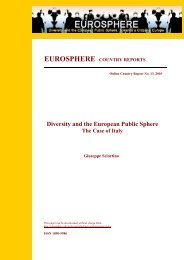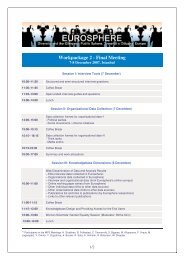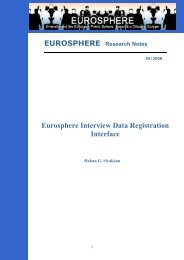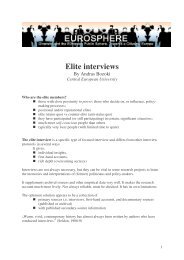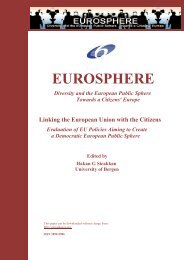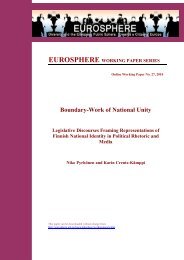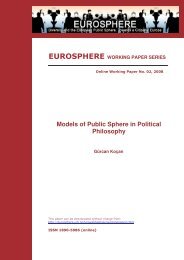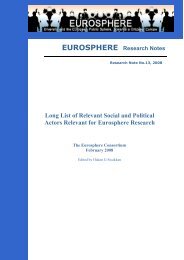Migrants, Minorities, Belongings and Citizenship. Glocalization and ...
Migrants, Minorities, Belongings and Citizenship. Glocalization and ...
Migrants, Minorities, Belongings and Citizenship. Glocalization and ...
You also want an ePaper? Increase the reach of your titles
YUMPU automatically turns print PDFs into web optimized ePapers that Google loves.
<strong>and</strong> individuals within the new context of increasing mobility, globalization, glocalization,<br />
<strong>and</strong> fading boundaries.<br />
2.1.3. A short presentation of the design of QC-CITBASE<br />
An effective use of the aforementioned tools led to a design of an extendable,<br />
updateable, <strong>and</strong> comparative small states citizenship database (QC-CITBASE) for<br />
mapping different forms of rights-exercise across countries. The project collected<br />
qualitative data about<br />
1) the changes in policies of citizenship <strong>and</strong> minority politics in the EU-member<br />
states that are caused by their relations with the EU, <strong>and</strong> the anticipated policy<br />
changes in the associated <strong>and</strong> waiting-list countries once they join the EU;<br />
2) the changes in forms <strong>and</strong> patterns of participation <strong>and</strong> voice through national<br />
states’ existing channels <strong>and</strong> arenas, <strong>and</strong> the participation dilemmas connected<br />
to these (i.e. disqualifications resulting from e.g. pre-determined nation-state<br />
ideologies requesting congruence between belongings <strong>and</strong> citizenship);<br />
3) the new globalizing forms <strong>and</strong> patterns of voice, participation, <strong>and</strong> access<br />
through glocal spaces <strong>and</strong> transnational organizations;<br />
4) the presence of certain existing national <strong>and</strong> supranational democratic<br />
institutions (i.e. primarily understood as public spaces effectively open to those<br />
who wish to have voice) inpolicy formation promoting inclusion <strong>and</strong> equality in<br />
participation, giving voice, <strong>and</strong> access to arenas.<br />
The data are based on information collected during case studies <strong>and</strong> targeted at<br />
generating knowledge about:<br />
● Types of misalignments between national citizenships <strong>and</strong> European citizenship.<br />
● Types of misalignments between belongings <strong>and</strong> national citizenships.<br />
● Types of misalignments between the European citizenship <strong>and</strong> belongings.<br />
● Types of contestations on citizenships <strong>and</strong> belongings.<br />
● Quality of participation, voice, <strong>and</strong> access deficits in traditional numeric <strong>and</strong><br />
corporate-pluralist channels at the micro-level.<br />
● Characteristics of glocal spaces in terms of participation, voice, access, <strong>and</strong><br />
relationships to traditional channels of participation <strong>and</strong> voice.<br />
51



